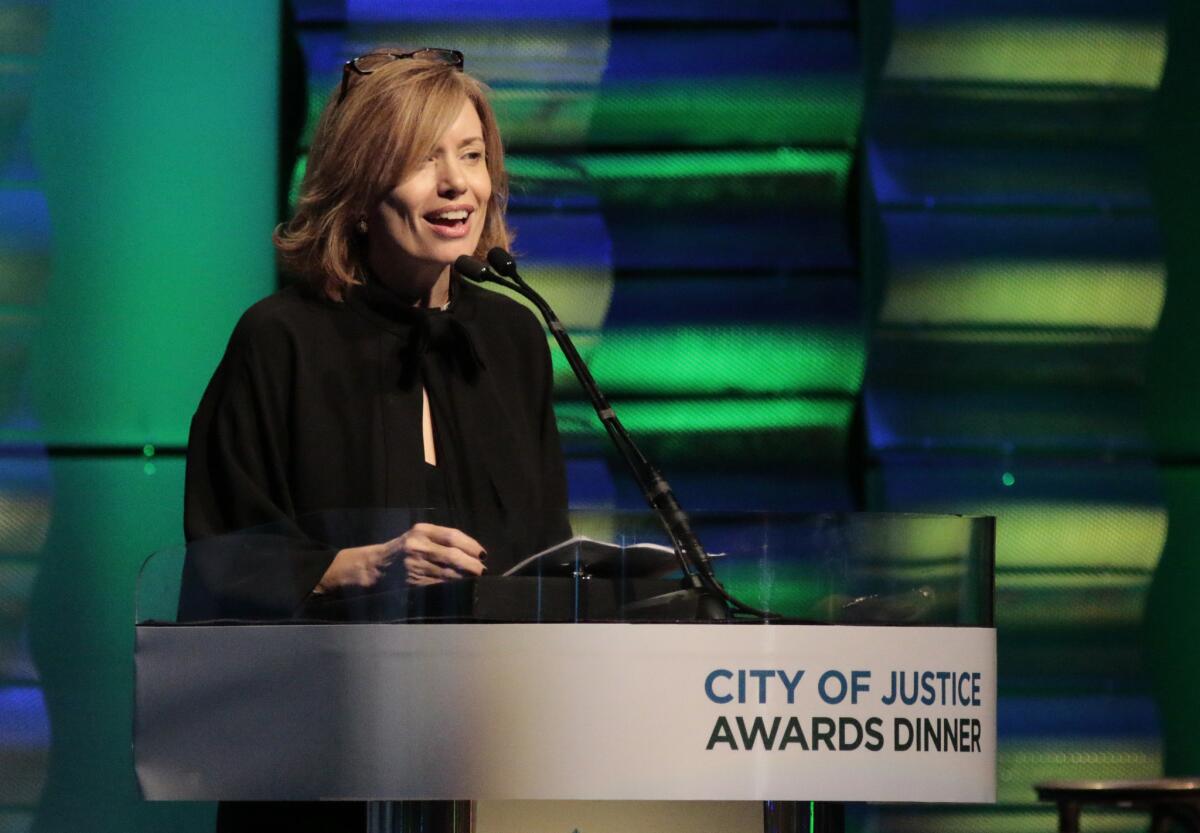L.A. Ethics Commission OKs more than $47,000 in fines for lobbying violations

Roxana Tynan, executive director of the Los Angeles Alliance for a New Economy, said omissions on lobbying forms that led to $30,000 in ethics fines were the result of “an unintentional mistake.”
- Share via
The Los Angeles City Ethics Commission agreed Tuesday to fine two nonprofits more than $47,000 for failing to accurately report how much they had spent trying to influence city lawmakers.
Both the Los Angeles Alliance for a New Economy, a politically influential nonprofit focused on labor and environmental issues, and the Hospital Assn. of Southern California, a regional trade group for hospitals, had registered some of their employees with the city as lobbyists.
Yet for years, the two groups had reported that they spent nothing on lobbying by those same employees, even as they spoke on a laundry list of issues at City Hall.
The commission fined LAANE $30,000 for a dozen violations over three years, which appears to be the highest for a lobbying violation that the Ethics Commission has ever imposed, according to commission records that date back more than two decades. The hospital group was fined $17,500.
Both groups said they had misunderstood the city rules on reporting lobbying expenses. If they hadn’t cooperated with the investigations, their fines could have been twice as high.
At the Tuesday hearing, Commission Vice President Serena Oberstein noted that LAANE had been “a longtime player” at City Hall. It is a nationally recognized nonprofit that has successfully advocated to boost wages for hotel and airport workers and to remake the city trash-hauling system.
LAANE also has strong ties to city leaders: Both City Councilman Mike Bonin and Amy Wakeland, the wife of Mayor Eric Garcetti, served on its advisory board and Councilwoman Nury Martinez sat on its board of directors.
As an established group, “they should know better,” Oberstein said.
LAANE acknowledged last year that it had failed to fill out the lobbying forms properly, after The Times reported that it had left key sections of the paperwork blank. It later revised its filings to show it had spent more than $175,000 lobbying the city from 2011 to 2014.
“We made a mistake, which we have fixed, and will ensure won’t happen again,” the group’s executive director, Roxana Tynan, said Tuesday.
After Ethics Commission investigators contacted the hospital group, it also amended its forms to reveal more than $108,000 in spending over two years. At City Hall, it had weighed in against forming a city health department and sought to exempt hospitals from the trash overhaul, among other issues.
At the Tuesday hearing, health management consultant Genevieve M. Clavreul argued before commissioners that the hospital group should have faced a higher fine to deter such violations.
“We’re not talking about a small organization,” Clavreul said.
Marty Gallegos, the hospital association’s senior vice president of healthcare policy and communications, said that since his group was alerted to the missing information, it had altered its procedures and was “pleased to put this matter behind us.”
With the fines, “it’s pretty clear that the commission staff wanted to send a message … to those who might be tempted to take a step over the line,” said Dan Schnur, director of theJesse M. Unruh Institute of Politics at USC.
But the historically high fines also reflect a shift, over time, in how the Ethics Commission punishes violators. Before Tuesday, the biggest fine the city had handed down for lobbying violations was an $18,000 penalty in 2000 for lobbying firm King R. Woods & Associates, which admitted to hundreds of violations, including not registering scores of clients and not reporting lobbying costs.
LAANE received a higher penalty — and the hospital group got one that was almost as high — for far fewer violations than Woods & Associates. That’s because the Ethics Commission altered the way that it calculates fines several years ago, in an attempt to make penalties more consistent, according to a report prepared by commission staff.
Rather than starting from zero, commissioners “wanted to start at the top” — the maximum fine possible — “and then work their way down to the extent that respondents cooperated,” said Neama Rahmani, former enforcement director of the Ethics Commission.
Under that system, commission staffers began setting out the maximum possible penalty — often $5,000 per violation — and then cut it in half if the violator cooperated. That ended up bringing the typical minimum penalty to at least $2,500 per violation. In the past, lower fines had been common.
Ethics Commissioner Nathan Hochman, who helped usher in those changes four years ago, said there was “no hard floor” to how much fines could be reduced and that the system wasn’t driving up penalties. Instead, Hochman said the commission had been tackling more serious violations than in the past.
But Commission President Jessica Levinson has questioned whether the practice should be reexamined. “I’m not sure the starting point should always be 100%” of the maximum penalty, she said.
Times staff writer Ben Poston contributed to this report.
Follow @latimesemily for what’s happening at Los Angeles City Hall
ALSO
Cal State Long Beach student sexually assaulted at frat party, police say
Deputies investigate deaths of mother, 87, and twin daughters in Hawaiian Gardens
Father of bride vanishes at wedding reception in Northern California
More to Read
Sign up for Essential California
The most important California stories and recommendations in your inbox every morning.
You may occasionally receive promotional content from the Los Angeles Times.










